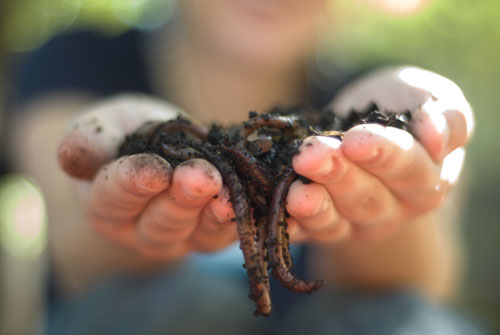Businesses Cash in on What Bugs do Naturally
‘Twas the night before Christmas and as Cassandra Ford would soon see, creatures were stirring, especially the pound of worms packaged under her Christmas tree.
For Ford, who heads the composting department for the city, getting worms for Christmas was like bringing her work home. Ford maintains the Lawrence Department of Waste Reduction and Recycling’s set of worms that it uses for vermicomposting — a process where worms break down food scraps into organic fertilizer — in addition to keeping her own vermicomposting worms at home.
“People thought I was crazy,” Ford said, “but now when my parents call, they always ask me how my worms are.”
Although people benefiting from bugs seems unusual, places such as the Department of Waste Reduction exploit the bugs’ natural processes for the businesses’ gain. Different bugs work different jobs, but all bug “employers” profit from the creepy-crawlies.
The vermicomposting worms at the Department of Waste Reduction eat their body weight in food scraps each week, which reduces the department’s waste. The worms produce an organic fertilizer, called worm castings, after three months.
“Sometimes we don’t have enough at the office to feed them, so some people will bring their food scraps from home,” Ford said.
The worms produce something else useful too — more worms. Ford said the department started with one pound of worms (about 1,000) a year ago, but worms produce offspring in just seven weeks.
“The worms will die eventually, but you’ll rarely have to buy worms again,” she said. “You’ll have to take some worms out, if anything.”
Lawrence’s Most Recent Hires: Ladybugs
About a mile down the street from the department’s worm bin, other city employees are working in the old Union Pacific Depot’s flowerbeds. The city purchased these ladybugs to fight off the growing aphid infestation.
“From a natural standpoint, lady beetles are great for feeding on aphids,” Jeff Whitworth, an extension entomologist with Kansas State University, said. “When you have a large aphid population, they are like cows feeding on grass.”
Ladybugs are a natural predator of aphids, but they are the most transient of the bug employees.
“I’ve seen too many people put ladybugs in their garden and then they are gone,” Greg McDonald, owner of Sunrise Garden Center, said. “But they leave because they didn’t have anything to eat.”
Still, the bugs are popular gardening partners. McDonald said he has already sold out of ladybugs for the year.
“Every year, we never have any left over,” he said.
Busy As A…
Unlike ladybugs that leave when the food is gone, other bugs bring the food with them and rely on the keeper to give them a house.
Richard Bean, owner of Blossom Trail Bee Ranch, who has owned bees for more than 30 years, said he had seen an increased interest in beekeeping.
Although no organization tracks the number of beekeepers in the United States, the number and size of beginner beekeeping classes has increased, confirming the trend.
A national beekeeping conference that took place in California in January registered 1,200 participants, up from about 600 the previous year, according to the American Beekeeping Federation.
Bean said he hoped to create a basic beekeeping class.
“I like to see more people get started,” he said. “There are getting to be a lot of beekeepers in Douglas County.”
A mysterious disease termed Colony Collapse Disorder may have sparked some of the recent interest in beekeeping. The number of honey-producing bee colonies has fallen from 5 million in the 1940s to 2.5 million now, according to the U.S. Department of Agriculture, causing some people to keep bees in an attempt to be saviors of the food supply. Whitworth said bees pollinate 80 percent of the crops in the United States.
The cause of CCD is unknown, but some attribute it to climate change, mites or even electromagnetic radiation from cell phone towers.
Bean said so far his 100,000 bees have not been affected from CCD. He said he expected about 100 pounds of honey this season, a larger-than-usual supply that he attributed to the tremendous amount of moisture and cool spring.
Like all bug employers, Bean’s business and some of his income is largely based on the temperature.
Bean said a freeze last April was the worst climatic disaster he had ever seen.
“I had a big bee population,” he said, “and then nothing. There was nothing for them to work with.”
Still, that didn’t make Bean nervous.
“The bees are such overachievers that someone has to be there to take care of them,” he said.
Although people have relied on bugs to do work for them for centuries, people today have mostly swatted bugs away until recently.
“We receive a lot of benefits that we don’t realize, like the breaking down of dead organic matter,” Whitworth said. “Willfully or not, we have used insects or been the recipient of beneficial aspects of insects. We have been able to use them where we need to.”
Some bugs are little more than a click away.
“Now you can buy worms on eBay,” composting specialist Cassandra Ford said. “A few years ago, you would think, ‘Who would do that?’ Now you can find them on the Internet and have them shipped to you overnight.”

